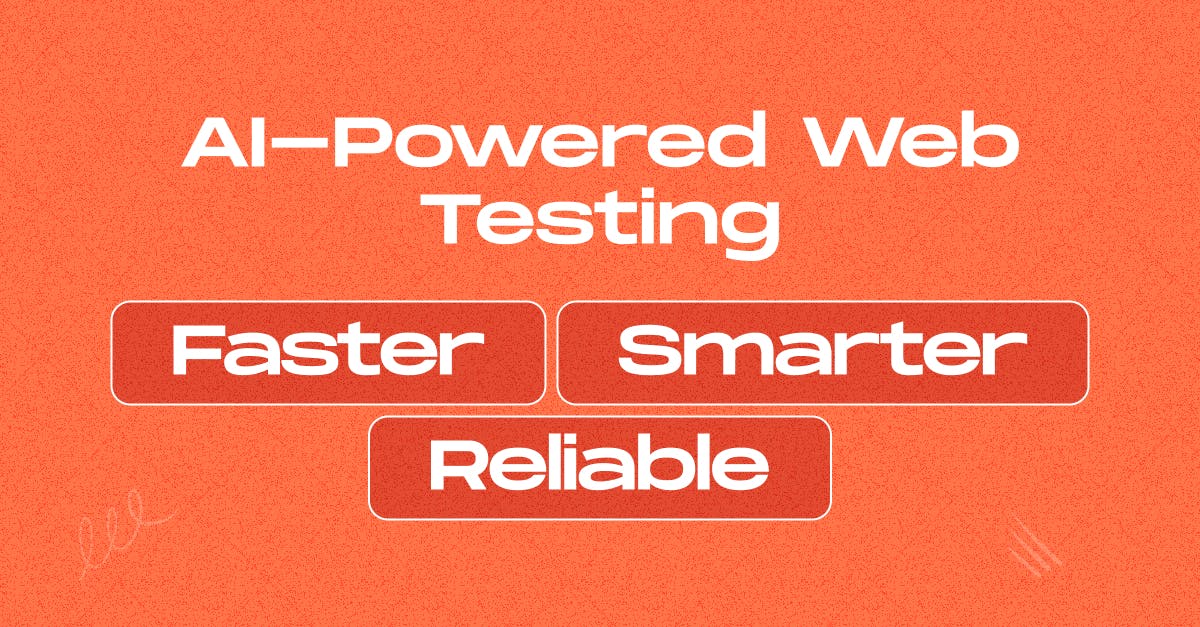February 14, 2025
AI and Automated Testing: Speeding Up Results Like Never Before

Nusrat Sarmin

Did you know that 77% of companies now rely on AI-powered testing to accelerate software development? (Source: Capgemini). As web applications grow more complex, traditional testing methods struggle to keep pace.
AI-driven test automation is revolutionizing the industry by improving accuracy, reducing manual effort, and delivering faster results.
The incorporation of artificial intelligence has drastically changed web development, especially in the areas of creation, testing, and maintenance. Among these, automated testing has benefited the most, as AI replaces slow, resource-intensive manual processes. With AI-powered web testing, businesses achieve smarter, faster, and more efficient results.
In this article, we explore the key resources, primary advantages, and the overall impact of AI-powered testing on modern web development.
How AI Enhances Automated Web Testing
AI is reshaping web testing by introducing self-learning algorithms that analyze patterns, detect anomalies, and optimize test cases. Unlike traditional automation scripts, AI-powered testing adapts to application changes, reducing maintenance costs and enhancing efficiency.
With machine learning and natural language processing, AI can generate and execute test cases, ensuring web applications remain robust and error-free.
Key functionalities include:
- Self-healing test scripts: AI detects changes in UI elements and updates test cases automatically.
- Test case generation: AI analyzes application behavior and generates test cases dynamically.
- Defect prediction: Machine learning algorithms anticipate potential failures before they occur.
- Visual testing: AI can detect UI inconsistencies that traditional automated tests might miss.
- Performance analysis: AI evaluates site performance and load testing.
- Continuous testing: AI integrates with CI/CD for real-time monitoring and quality assurance.
AI-Powered Testing Tools in Web Development
Several AI-driven application testing tools have emerged to streamline web development workflows. Some notable options include:
- Testim – Uses machine learning to create stable and adaptive UI tests.
- Applitools – Leverages AI for visual testing and identifying UI regressions.
- Mabl – Automates end-to-end testing with intelligent test creation.
- Functionize – Utilizes AI for self-healing test automation, reducing test failures.
- Selenium with AI Integration – Traditional automation tools like Selenium now integrate AI for better script maintenance.
These tools minimize human intervention, accelerate testing cycles, and enhance the reliability of web applications.
What Are AI Agents in Test Automation?
AI agents are intelligent systems designed to automate tasks by learning from patterns and making decisions without constant human intervention. They are widely used in various domains, including customer service, cybersecurity, and data analysis. But, what are AI agents in the context of test automation in web development and what do they do?
AI agents in test automation are autonomous systems that analyze, execute, and optimize test cases using artificial intelligence. These agents leverage machine learning and predictive analytics to identify potential issues before they impact users. Unlike conventional automation scripts, AI agents adapt dynamically to UI changes, reducing maintenance overhead.
For example, AI agents can:
- Detect broken elements and adjust test scripts automatically.
- Identify patterns in test failures and suggest solutions.
- Improve test coverage by predicting untested user flows.
By integrating AI agents, businesses can achieve faster, more efficient, and more resilient web testing processes.
Key Benefits of AI in Automated Testing
AI-driven test automation offers multiple advantages, including:
➽ Speed and Efficiency – AI reduces testing time by automating repetitive tasks.
➽ Enhanced Accuracy – Machine learning algorithms eliminate human errors in test execution.
➽ Self-Healing Capabilities – AI can automatically update test scripts when UI changes.
➽ Scalability and Adaptability – AI adapts to complex web applications with minimal manual intervention. Also, adapts to various development environments.
➽ Early Bug Detection AI identifies potential defects before they reach production
➽ Cost Reduction – Fewer resources are needed for test maintenance and execution.
AI in Web CMS and JAMstack Testing
Artificial Intelligence enhances modern Web CMS and JAMstack testing by automating content optimization, performance analysis, and security checks. AI-driven tools detect issues in real time, ensuring seamless user experiences. In JAMstack website development, AI assists in automated testing, API validation, and predictive performance enhancements. This makes web development more efficient, scalable, and adaptive to changing user needs.
The Future of AI in Web Development Testing
As AI continues to evolve, web development teams will experience unprecedented efficiency and reliability in automated testing. The future of AI in web testing is promising, with advancements in:
✔ AI-Driven Code Generation – AI will write and optimize test scripts without human intervention.
✔ Predictive Analytics – AI will forecast potential issues before deployment.
✔ Hyper-Automation – AI will integrate with DevOps for fully autonomous testing.
✔ Enhanced Security Testing – AI will identify vulnerabilities and prevent cyber threats.
✔ Self-improving test cases: AI models will adapt and improve automated tests over time.
Conclusion
AI-powered automation is revolutionizing web development testing, enabling faster and more accurate results. From intelligent testing tools to AI agents, the integration of artificial intelligence minimizes manual effort and ensures robust web applications. As technology advances, AI-powered web testing will become even more important. It will optimize testing processes, improve efficiency, and enhance reliability in modern web development.
Need help implementing AI-powered automated testing in your web project? StaticMania is here to help you! Let’s Discuss Today!
FAQs
Yes, AI ensures faster issue detection, optimized test execution, and performance monitoring, resulting in improved website speed and reliability. It helps identify bottlenecks in real-time, allowing developers to fix issues before they impact users.
AI testing will evolve with self-healing test scripts, predictive analytics, and more adaptive automation frameworks. As AI advances, we can expect smarter debugging, automated test case generation, and deeper integration with DevOps workflows.
AI can analyze test data, generate test scripts, detect UI changes, perform self-healing tests, and optimize test execution for faster results. It can also improve test coverage by identifying edge cases that human testers might overlook.
AI reduces testing time, enhances accuracy, minimizes human effort, and helps detect issues early, leading to faster deployment. It also improves scalability, allowing teams to run thousands of tests simultaneously across different environments.
AI can automate functional testing, regression testing, performance testing, UI testing, and security testing. Additionally, it can assist in API testing, accessibility testing, and even load testing to ensure a seamless user experience.
Popular AI testing tools include Selenium with AI plugins, Testim, Applitools, Mabl, Functionize, and Katalon Studio. These tools leverage AI for visual testing, self-healing test scripts, and predictive analytics to enhance testing efficiency.
The best tool depends on the project needs. Testim is great for AI-powered test authoring, Applitools for visual UI testing, and Mabl for intelligent test automation. Each tool offers unique features, so teams should choose based on their specific requirements, such as cross

